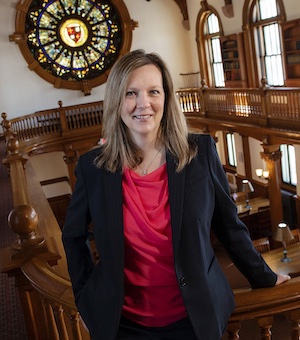By Benjamin Pontz
From the age of three, Kathryn Morris knew she wanted to be a psychology professor. Growing up in Granville, Ohio, Morris was surrounded by the liberal arts—a biology professor lived on one side of her childhood home, a film professor lived on the other, a geologist and a sociologist lived across the street, and an English professor and a music professor lived down the road. And then there was her dad . . . a psychology professor at Denison University. Morris is, quite literally, a child of the liberal arts.
When it came time for her to go to college, she applied almost exclusively to liberal arts colleges, landing at Gettysburg College in the bucolic Pennsylvania countryside, its back against the historic battlefield. She majored in psychology (and was elected to Phi Beta Kappa as a junior), enrolled in a Ph.D. program at the University of Texas immediately upon graduation, and four years later began as a tenure-track assistant professor of psychology at Butler University in Indianapolis. It is there that she has spent the last 24 years, including nine as provost. Now, Morris will take on a new challenge: in July, she will become the 19th president of St. Lawrence University in Canton, New York.
For Morris, it is a return to the type of small liberal arts college environment where she has long felt at home.
“Growing up on the campus of Denison and in that neighborhood, that was where I came to understand what the liberal arts were all about, that you get exposed to all of those areas of inquiry and that makes you a well-rounded person, a person who thinks deeply and thinks critically and focuses on communication and cares about the world,” she said. “Those are the philosophical approaches that all the people around me as I was growing up espoused.”
As she went on the academic job market after graduate school, she sought a private, undergraduate-focused institution in the Midwest and found it in Butler, where she taught social psychology in the College of Liberal Arts and Sciences, one of six schools in the university. In 2010, she became the inaugural president of the Theta of Indiana chapter of Phi Beta Kappa at Butler, a key moment in recognizing the college’s distinction in the liberal arts and sciences.
“I saw the onset of a Phi Beta Kappa chapter at Butler as a really good way to demonstrate that we really excel at the liberal arts and sciences,” she said. “We always knew that we were good in the liberal arts and sciences, but when you are invited to shelter a chapter of Phi Beta Kappa, you have that external validation that what you know to be true is true.”
Two years later, Morris was asked to serve as interim provost of the university and soon realized she liked the problem solving and broader institutional leadership responsibilities of senior college administrators. She applied to continue in the role and became Butler’s Vice President for Academic Affairs and Provost in 2013. Over the past nine years leading the university’s academic affairs division, Morris has focused on campus infrastructure, student success, and faculty development alongside her participation in university-wide strategic planning and fundraising efforts. All of these efforts, she said, had an eye towards empowering undergraduate students and, in the long run, making their degree more valuable.
Morris will lead efforts towards many of those same goals as President of St. Lawrence University. As higher education institutions nationwide confront declining demand among prospective students and changing demographics that affect institutional financial aid budgets, it is no easy time to take the helm at a small liberal arts college.
For Morris, these challenges make it an imperative for schools like St. Lawrence to be able to tell a compelling story about the long-term impact of a liberal arts education on one’s life and career. Outcomes matter to prospective students and their parents. Communicating that the impact of a liberal arts education transcends mere credentials and encompasses a “holistic approach to student development that empowers students to make an impact in the world in a way that is appropriate for them” lies at the heart of Morris’s new role, she said.
Still, academic programs matter too, and thinking creatively about what “fits” in a liberal arts education may open the door to programs that may once have been seen as incongruent with the liberal arts.
“There is a lot of evidence that some liberal arts colleges are thinking broadly about what can fit within the liberal arts education. It might be that 20 years ago we would have said, ‘Oh, that can’t possibly be something that we might offer in a liberal arts environment,’ but now, a pretty wide range of things are offered, and people are finding ways to keep hold of the essence of the liberal arts education and still provide some professional development and career development skills for their students,” she said.
Morris already sees evidence that St. Lawrence is among those forward-thinking institutions as it has begun to consider its role in New York’s North Country community, how international education and co-curricular programs are core to its liberal arts mission, and approaching the challenges ahead as an institution “on the move and ready to do what it takes to remain a high quality liberal arts college,” she said.
And whatever that is, Morris, a lifelong champion of the liberal arts, will be their leader.
“All of my career has been focused on the value of the liberal arts in the holistic development of the student,” she said. “It’s part of who I am.”
ΦBK member Benjamin Pontz is a 2020 graduate of Gettysburg College who double majored in political science and public policy with a minor in music. He is currently a Fulbright Postgraduate Scholar at the University of Manchester. Gettysburg College is home to the Iota of Pennsylvania chapter of Phi Beta Kappa.




